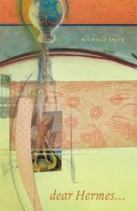dear Hermes Review
The CWILA numbers were a wake up call for “anyone interested in gender equity in the literary arts,” showing much higher percentages of book reviews in Canadian literary journals by men than women. Responding to the question, where are the female reviewers? Room Magazine has added more reviews and I would very much like to respond and be a part of changing those numbers (and I will be!) but for all the doting and/or griping I do over books with my co-writer, I have yet to sit down and actually write a review. So I am doing one on here first. Book review lite. Also, it’s the perfect book for us, with its ode to Dionysus whose female followers were called “maenads” or “the maddedned ones” (73) and were often described as frenetic, ecstatic, and violent. According to one myth, they even ripped Orpheus limb from limb. Obviously, this was because Orpheus had sworn off the ladies and, you know, without Orpheus’ virile member, their wombs would have nothing to weigh them down and would begin to rise up toward their brains. Anyway, I digress.
Review: dear Hermes, by Michelle Smith (Edmonton: University of Alberta Press, 2012)
dear Hermes begins with the line, “no stars danced at my birth” (“The traveller writes by the light of the liar’s star”) and ends with images of “dead rabbits” and “bruised tulips” (“A still life, with books”). Between those bookends, however, is not merely the arc of a life, but an endless cycle of more births, more deaths, continuous entrances and exits. The poems in Michelle Smith’s debut collection explore Greek mythology, family history, and questions of immortality. As the title suggests, many of the poems are letters addressed to Greek gods, beings who, though immortal, “bled time and again” (“The traveller writes from her childhood home”), letters addressed by one “double-bound by birth and tragedy” (“the traveller writes from the edge of Aegean”). Smith’s poetry traces the line between life and death, takes us unexpectedly to babies with arthritic hands, newborns lying next to urns.
Throughout all the lives and afterlives in these poems, time behaves erractically: rushing, crawling counter-clockwise, standing still:
“time is as malleable as air, and air is as palpable as water,
the water that brings the sky down to stone and skin, and everything
is made as slippery as the roots of the trees that grip the ground
of the village ruins as the sun sinks under a blurred horizon of hills
that look like overturned bowls”
(Dartmour)
In this image, the life-giving roots juxtaposed with the village ruins blur the lines between life and death much like the described blur of the horizon, the precarious line of the in-between. This theme sometimes manifests in the text itself as well. In “ile de la cite,” the anaphora in roman text sits still between the lyrical italicized section, much like the “still, silent heart of paris, the city’s past, present, future” it describes.
The varied tones of the poems provide a good balance, and many of the letter poems are quite funny. The titles are often humourous in their long length: “the traveller writes after a few drinks with Ceres,” for example. In that poem, Smith plays around with Zeus’ “postcard poetry, fatal and sauve”:
“what with your hair of golden August wheat,
your slender ankles. (or so says Zeus,
ever the exonerator of injustices
he files away under Indiscretions: Minor)”
Some of these poems feel stronger, more polished, than some of the heavier-handed meditations on death. I expected “you are too romantic, mon cherie” to have more of a twist of irony that never seemed to come. The collection has perhaps one too many image of tears and lips, “how glittering tears in starlight burn,” and at times it can feel a bit romantic.
An effective technique in these poems is the moments of displaced humour. There is the lighthearted inappropriateness of giggling in a monk’s cell in “The Annunciation” but also the visceral fear of the section in “bear dance” when “He tries to make it funny, to ignore his sense/ of hairs on the back of her neck standing on end/ when he enters.” That section of the poem ends:
“her mother’s voice rattles on
and rattles off against her skull
and a red neon sign flashes vacancy
across her white-as-a-sheet cheek”
The assonance saves the white as a sheet idiom and it’s haunting, eerie, how this girl is hollowed out. While dear Hermes has some awkward narration/ hyperbaton and some romanticization, it is an engaging dialogue with life, death, fear, and grief. By turns funny and halting, the collection finds new ways to grapple with the notion that “Either way you long to live forever. Either way, you lose” (How to lift the heart into the throat”).
Check out Room’s invitation to Become A Reviewer
Buy Michelle Smith’s debut collection here
Find more information on the numbers mentioned above at The Canadian Women in the Literary Arts website


